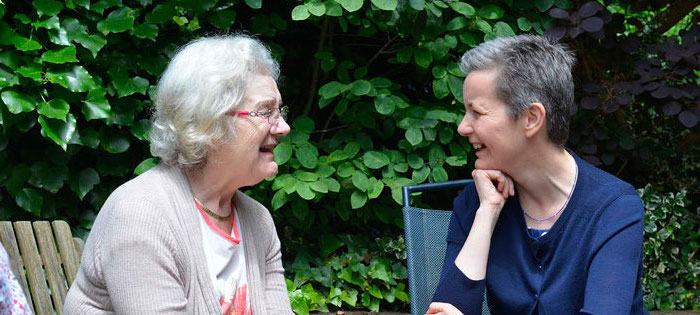
There are many options available for providing care to a loved one, even if you decide to care for them at home.
But a lot of people get caught up with the idea that having them at home is just too much work. They think that if they don’t have the time themselves, nobody will care appropriately for their loved one.
So they turn to caregiving facilities or retirement homes instead of considering the services that could make keeping a loved one at home a reality.
On the other hand, others become fixated with the idea of keeping them at home when their needs require far more professional assistance.
In this blog post we’ll take a look at the advantages and disadvantages of keeping a loved one at home. We’ll also take a look at some of the resources for In-Home Care that could be available to you, and how you should go about deciding what’s best.
The Advantages Of In-Home Care
These are the general upsides to in-home caring. Of course, they may vary according to your particular situation, but they should help you make an informed decision.
- No Adjustment Stage: Your loved one can stay in their own home, within surroundings they are familiar with. This is a great option for people who have cognitive issues and get lost in unfamiliar places or those with vision impairment, as going to a new place can be quite difficult for them.
- Less Expenses: The drain on their finances will be reduced as they will have to spend a minimum amount of money on reduced care hours.
- More Self-Sufficiency: If they are able to, they would have the option to prepare their own meals, even if it’s just heating up things on their own.
- Family Involvement: You do not have to completely hand over the care to someone else – you can have more involvement in their care (if you have the time).
- More Visits: It can be easier to visit them, since you probably can come and go more freely than on a facility. They can also be closer to your kids or other family members.
Have a parent that’s causing you stress?
Download our free Challenging Behaviors Guide to discover how you can figure out what’s going on and maintain your relationship, and de-stress each day.
Resources For In-Home Care
There are a wide variety of services that can intensify these advantages. For example Meals on Wheels is a service that home delivers nutritious meals on a daily basis to people in care.
They are available in several countries so it’s only a matter of seeing if they have operations where you are. Otherwise, they might be a similar service being carried out by a similar enterprise near you. It’s only a matter of researching or asking around.
You can also turn to outside help like with Companion Care Services or Personal Care Assistants. These are hired professionals that can either provide professional nursing or companionship. The latter is great when your loved one requires light assistance but is maybe alone most of the day because family members have other activities.
As with most services, the availability and even naming of this will vary by country, but know that there are options out there. As an example, Here’s a comprehensive list of the services in America.
Downsides Of In-Home Care
However, even if you find a combination of hired services and your own efforts that could work for your loved one, there are always some disadvantages that we must consider.
Remember, this is about weighing out all the options in order to find out what is best for everyone involved. So let’s take a look at the cons:
- New Faces, Constant Adjusting: The people that you hire to care or assist your loved one may change frequently. If you can get the same person all the time, that’s great. But the reality is, businesses often change staff and people move on to new opportunities even if they’re free agents. With every new person, your loved one will have to start all over again and there’s no telling if he or she will like every one of them.
- Services May Fall Short: With some services, the person coming in to help may only be there for a short time and only to do specific tasks like prepare a meal, do some household chores, attend to hygiene needs or whatever has been agreed. Finding if this is enough and there are family members willing to fill the gap can be a tricky ordeal.
- Keeping Track Of Expenses: We mentioned above that in-home care could be more cost-effective, but you should always consider that someone will have to stay on top of all the bills and make sure every service is paid for in due time. Even if no services are hired, someone will have to look over your loved one’s monthly expenses and maybe even the cost of opportunity if you are working less in order to care for them yourself.
- Pressure: In-Home Care is also likely to put more pressure on you to go and check on your loved one to ensure they are safe and well cared for, since you’re basically supervising everything.
- Loneliness: Extended periods of time on their own can increase the likelihood of social isolation, even if they are with a hired professional, it’s hard to replace the company of family members they’ve known for years or other groups of seniors they may empathize with. In turn, this can increase the risk of mental health issues like depression or even physical issues like the risk of falls or accidents when they are by themselves.
Assessing Your Own Situation
This list is only a simple glance. We provided the same number of upsides than downsides but the situation will always vary on a case by case basis. There is simply no “one-size-fits-all” solution when it comes to care.
One important thing to consider though, is being open towards the best possible solution. Otherwise, the consequences of holding on to just one option could be dire.
For example, keeping a person who is becoming frail at home at all costs may do more harm than good. A lot of this will fall on the families’ shoulders and, from my experience, there is usually one person who bears the brunt of this role.
Often the cost for this person can be really high, and even higher if that person is also holding down a full time job. It is hard enough to manage one household and a full time job, but managing two may be enough to push someone over the edge.
Love Doesn’t Need To Be Irrational
I completely understand wanting to take the caregiving role after everything your loved ones have done for you in the past.
If you are in this situation, and weighing up what to do, think very carefully before you commit yourself to the caring role. Plan ahead and do a risk assessment of the situation.
If you do decide to keep your loved one at home, don’t do it out of duty. Do it out of love and with full knowledge of being able to do it.
Share The Decision
Lastly, whether you choose to care for them yourself, hire people to come into their home occasionally, or fully taking them to a retirement home, remember that it should be, if possible, a decision you make with them.
Lay it all out in front of your loved one and involve them in how you came to the idea you have and why you think it’s the best option.
If your loved one becomes unreasonable about it, then you may have to risk their wrath. Just make sure whatever you propose, that you do it for the right reasons.
If you’ve made it this way, you do not have to justify to anyone why the decision was made either way.



